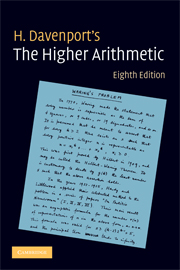I - Factorization and the Primes
Published online by Cambridge University Press: 05 June 2012
Summary
The laws of arithmetic
The object of the higher arithmetic is to discover and to establish general propositions concerning the natural numbers 1, 2, 3, … of ordinary arithmetic. Examples of such propositions are the fundamental theorem (1.4) that every natural number can be factorized into prime numbers in one and only one way, and Lagrange's theorem (V.4) that every natural number can be expressed as a sum of four or fewer perfect squares. We are not concerned with numerical calculations, except as illustrative examples, nor are we much concerned with numerical curiosities except where they are relevant to general propositions.
We learn arithmetic experimentally in early childhood by playing with objects such as beads or marbles. We first learn addition by combining two sets of objects into a single set, and later we learn multiplication, in the form of repeated addition. Gradually we learn how to calculate with numbers, and we become familiar with the laws of arithmetic: laws which probably carry more conviction to our minds than any other propositions in the whole range of human knowledge.
The higher arithmetic is a deductive science, based on the laws of arithmetic which we all know, though we may never have seen them formulated in general terms. They can be expressed as follows.
Addition. Any two natural numbers a and b have a sum, denoted by a + b, which is itself a natural number.
- Type
- Chapter
- Information
- The Higher ArithmeticAn Introduction to the Theory of Numbers, pp. 1 - 30Publisher: Cambridge University PressPrint publication year: 2008



